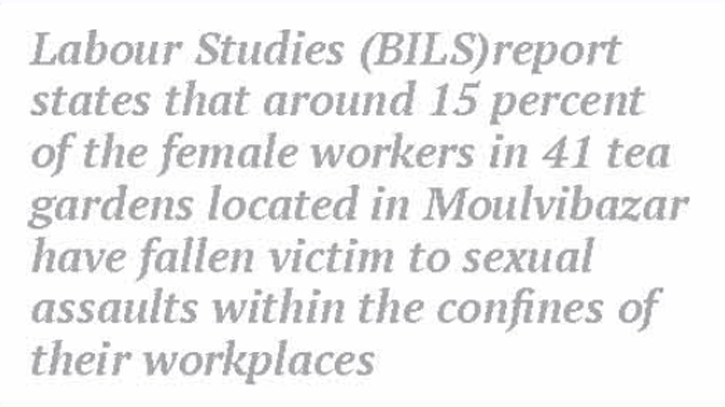
Photo : TDM
Female tea workers, a vital force in the industry, often silently endure sexual harassment, exploitation, and neglect but hardly complain in fear of losing their jobs and the weight of social stigma that may follow later.
A recent investigative report conducted by the Bangladesh Institute of Labour Studies (BILS) has brought to light a troubling reality, stating that around 15 percent of the female workers in 41 tea gardens located in Moulvibazar have fallen victim to sexual assaults within the confines of their workplaces. This alarming statistic translates to 22 female workers out of a total of 150.
Shockingly, the study reveals that out of the victims, a staggering 69 percent have chosen to remain silent, refraining from lodging complaints against their harassers. In addition, of the 41 tea gardens surveyed, approximately 53 percent are host to patras (wine shops), with nearly 28 percent of these establishments operating illegally, according to the report. Many female workers have recounted disturbing accounts of being sexually harassed by their male colleagues who became inebriated at these Patras.
Worse yet, these tea gardens lack the presence of sexual harassment prevention committees, leaving the female workforce even more vulnerable.
When questioned about the prevalence of illegal Patras, Tanvir Momtaz, director of operations and intelligence at the Department of Narcotics Control (DNC), expressed ignorance, saying, "We will investigate the matter." The study further exposes the grim reality of physical abuse experienced by female workers at the hands of their higher-ranking colleagues and officers within the gardens.
Around 63 out of 150 workers (43 percent) claim to have suffered verbal abuse as well. Astonishingly, a distressing 88 percent of female workers are forced to answer nature's call in the open sky due to the complete absence of toilet facilities within these tea gardens.
These women, who earn daily wages of Tk 168, 169, and 170 across three categories (A, B, and C), reveal that nearly 25 percent of them have been compelled to halt their children's education due to financial constraints.
Furthermore, these gardens fail to provide a consistent water supply, relying instead on jars scattered throughout the premises. A single male or female worker in each garden is tasked with distributing water, which is used for various purposes by the laborers. Tragically, approximately 65.7 percent of workers are constantly plagued by water-borne diseases.
The tea garden authorities are evidently in violation of the Bangladesh Labour Act of 2006, specifically Sections 5 and 6, which pertain to the issuance of appointment letters, ID cards, and service books to employees.
This distressing situation affects a substantial workforce, as roughly 1.40 lakh male and female workers toil away in 167 tea gardens nationwide, as indicated by the study conducted during April, May, and June of 2023. Alarmingly, over half, or approximately 55 percent, are female workers.
Md Mujibur Rahman Bhiuya, vice chairman of BILS, told The Daily Messenger that the report contains recommendations for various stakeholders, including the government, central executive committees, and primary and valley executive committees.
These recommendations address issues such as employment security, women's leadership, water and sanitation, and social security protection, among others. Bhiuya said, "The government should take action to solve workers’ problems and secure their rights."
However, Saif Uddin Ahmed, inspector general (additional duty) of the Department of Inspection for Factories and Establishments, declined to comment when approached for a statement on this pressing issue.
TDM/SD








